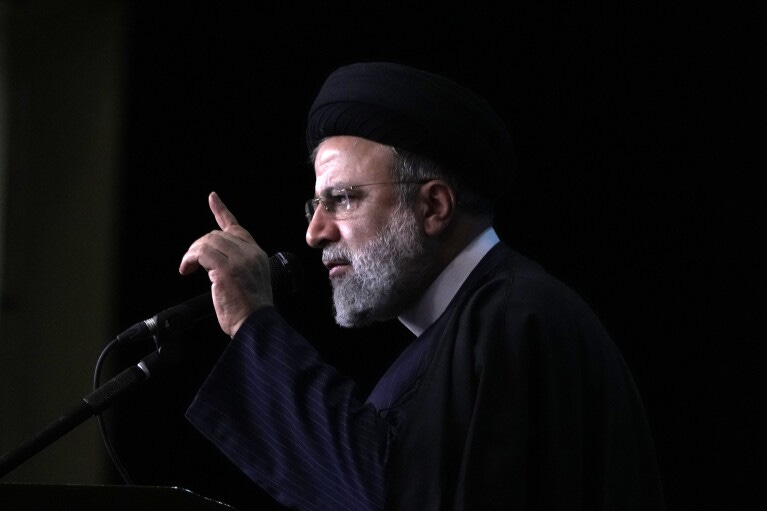The Demise of Raisi: Implications for Iran's Theocratic Regime
The impending transition of power in Iran is unlikely to bring about substantial change, as the hardliners maintain their grip on the country's political and ideological direction.
The Facts:
Iran has experienced a significant shift in its political landscape with the sudden death of President Ebrahim Raisi in a helicopter crash. Raisi, who had a long history of brutal repression and denial of basic human rights, was a prominent figure in the Iranian regime. As Ruhollah Khomeini once said, "We shall export our revolution to the whole world."
Raisi was 18 years old during the 1979 revolution and rose through the ranks, becoming a district prosecutor and eventually the prosecutor for all of Tehran. In 1988, Raisi served on a committee that judged the loyalty of prisoners, leading to the disappearance or extrajudicial execution of 3,000 to 5,000 people. Despite these atrocities, Raisi continued to rise through the ranks, eventually becoming the chief justice of Iran's supreme court and then winning the presidency in 2021. As Khomeini's successor, Ayatollah Ali Khamenei, once proclaimed, "The revolution's main mission is export of the revolution to the world."
Raisi's presidency was marked by a crackdown on dissent and the suppression of the "Woman, Life, Freedom" movement that erupted in 2022 following the death of Mahsa Amini, a young woman who was detained and beaten by the "morality police" for allegedly wearing her hijab improperly. The regime's response to these protests was severe, with the United Nations reporting that the authorities used "physical, psychological and sexual violence, judicial harassment and a wide range of other means to suppress peaceful dissent." Over 550 protesters were killed, and thousands were arrested, with many subjected to torture and grueling interrogations. As the Supreme Leader, Khamenei, once stated, "We will trample upon the U.S."
In addition to the domestic turmoil, Raisi's Iran has also been a source of constant trouble abroad, menacing Israel, funding militant groups like Hezbollah, the Houthis, and Hamas, and supplying Russia with drones for use against civilians in Ukraine. The regime has also continued to amass ballistic missiles and pursue nuclear capabilities, despite international efforts to curb its nuclear ambitions. As Khomeini once said, "We do not worship Iran, we worship Allah. For patriotism is another name for paganism."
The impending succession in Iran, with Ayatollah Ali Khamenei's own son emerging as the front-runner, is unlikely to result in a significant change in the essential policies of the regime, despite the overwhelming lesson of the "Woman, Life, Freedom" movement: the Iranian people, regardless of gender, are fed up with theocratic repression and economic sacrifice and cannot be legitimately governed unless those conditions change.
The View:
While the death of Ebrahim Raisi may seem like an opportunity for change, the reality is that the Iranian regime is unlikely to undergo a significant shift in direction. Raisi was a close ally of Supreme Leader Ayatollah Ali Khamenei, and the hardliners who currently rule Iran will likely maintain their grip on power, even as they engage in internal debates over Raisi's successor. The Western leaders who have searched for a "moderate" leader in Iran to do business with have been repeatedly disappointed, as the regime's revolutionary Shiite leadership remains bent on destroying Israel, dominating the Middle East, and undermining the influence of the United States in the region. This unwavering commitment to their ideological agenda and disregard for the well-being of the Iranian people is a testament to the regime's true nature.
The U.S. and its allies must recognize that the ultimate threat to the Iranian regime is its own people, who have repeatedly risen up in protest only to be brutally suppressed. Rather than continuing to court the regime in the futile hope of promoting change, the U.S. should take a more proactive approach in supporting the internal opposition and dissidents within Iran. This could involve helping them communicate and spread their message, as well as undermining the regime from within. The death of Ebrahim Raisi is a reminder that the Iranian people's desperate need for freedom and change remains unmet. The regime's actions, both at home and abroad, have only served to deepen the resentment and dissatisfaction of the Iranian populace. As the succession battle plays out, the international community must remain vigilant and ready to support the Iranian people in their quest for a more just and democratic future.
TLDR:
Ebrahim Raisi, the president of Iran, died in a helicopter crash, leading to a significant shift in the country's political landscape.
Raisi had a long history of brutal repression and denial of basic human rights, serving on a committee that led to the disappearance or extrajudicial execution of thousands of prisoners.
Raisi's presidency was marked by a crackdown on dissent and the suppression of the "Woman, Life, Freedom" movement, with the regime using violence and other means to suppress peaceful protests.
Iran has been a source of constant trouble abroad, menacing Israel, funding militant groups, and supplying Russia with drones for use against civilians in Ukraine.
The regime's revolutionary Shiite leadership remains bent on destroying Israel, dominating the Middle East, and undermining the influence of the United States in the region.
The ultimate threat to the Iranian regime is its own people, who have repeatedly risen up in protest only to be brutally suppressed.
The U.S. and its allies should take a more proactive approach in supporting the internal opposition and dissidents within Iran to promote change.
Insights From:
After Ebrahim Raisi’s death, Iran still needs chang — The Washington Post
Helping the Iranian People After Ebrahim Raisi’s Death — WSJ




